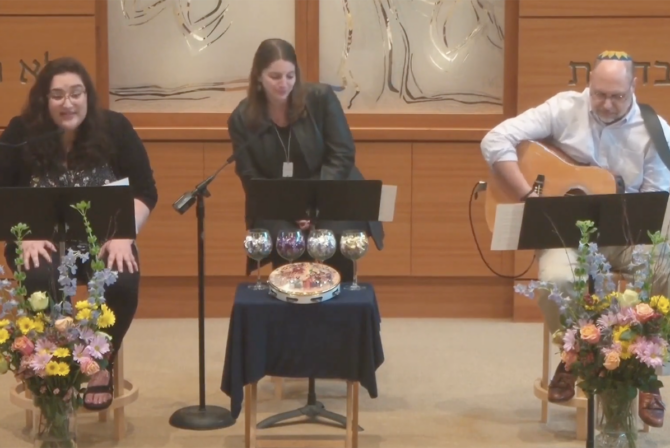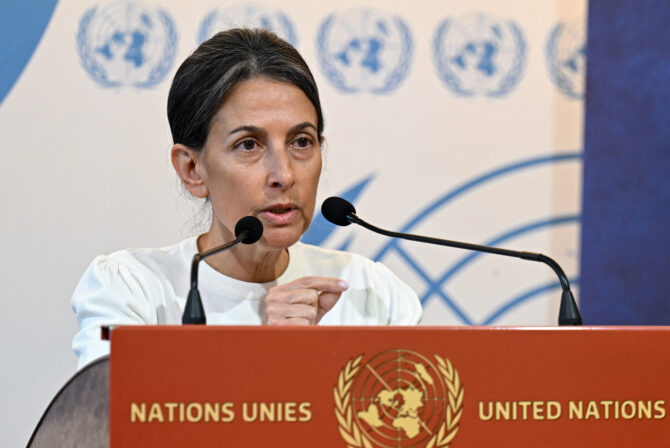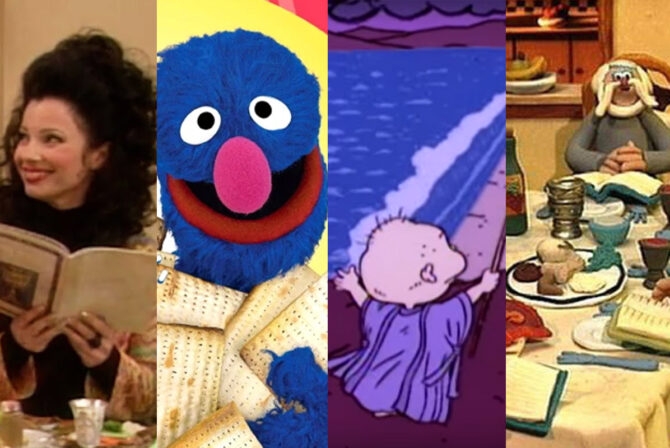This post is part of our Torah commentary series through the perspective of a new mom. This Shabbat we read Parashat B’shalah. To read a summary of the portion and learn more, click here.
I once went to a “New Agey” Passover retreat deep in the Israeli desert. The woman leading it was a kind of hippie Jewish priestess: long hair, flowy dresses, batik. To end the retreat, she had us all perform this birth ritual she made up based on the crossing of the Sea of Reeds, which we read about in B’shalah, this week’s Torah portion.
The Israelites’ Exodus from Egypt, she explained, was actually a birth narrative; they passed through the narrow canal made by the waters standing apart, and were transformed from Egyptian slaves to free Israelites, servants of God. And we were going to re-enact this.
So we all divided into pairs and stood in a line, made a giant tunnel by joining our hands overhead, and participants volunteered to be “birthed” one after the other by crossing the Sea of Reeds, which in this case meant being carried on their backs through the tunnel of arms overhead.
I wasn’t sure how I felt about the whole thing. I chose to remain part of the tunnel.
*
Though I imagine literal re-enactments are relatively rare, commentators do often describe the exodus from Egypt as the birth of the Israelite nation.
But birth is a strange metaphor for the exodus. After all, the Israelites aren’t babies. Many of them are adults, leaving fully formed lives to take on a new role in the world.
As they cross the Sea of Reeds, they leave their familiar Egyptian identities and head into the unknown: a wilderness where they will follow a cloud by day and a pillar of fire by night. A surprisingly mystical new existence, a period of wandering. Close to God, far from their old lives.
*
I had thought I’d slip gracefully into motherhood, magically transformed by the birth. But I’m still a little embarrassed to admit that it hasn’t been easy for me to let go of the life I’d built, with its small luxuries. Sleeping, reading the paper, watching movies on planes, folding laundry that stays folded; it feels so trivial. How can I miss these stupid little things when the miracle of life is happening before my eyes, when I am blessed with my sweet, rambunctious little Sylvia? And yet, sometimes I do.
To my relief, it seems the Israelites had similar problems letting go of their old life, even though their old life was literally slavery. They seem pretty happy after crossing the Sea of Reeds, but soon enough they start to grumble about their life in the desert.
First the water tastes bitter. Then they start to miss their delicious Egyptian meals. They go so far as to wonder if they should have ever left Egypt in the first place: “If only we had died by the hand of the Lord in the land of Egypt, when we sat by the fleshpots, when we ate our fill of bread!”
In Rabbinic commentary, the Israelites get a fair amount of flak for their whining in the desert. But here’s the thing: every time they complain, Moses gets upset, but then God fixes the problem.They mutter about the water tasting weird; God sweetens it. They agitate about missing Egyptian food; God gives them manna, which, according to tradition, tastes like whatever you want it to. They wander on and need water again; only after they threaten a rebellion and question God’s very existence does God show Moses where to find water.
*
I find it interesting that God doesn’t anticipate the Israelites’ needs. It’s almost like God is actually waiting for them to ask, as if the asking itself is the point of the story.
As slaves in Egypt, their lives were hard, but certain necessities were provided for them. Now they have to provide for themselves, to ask for what they need. Only then can they get it.
And I’ve noticed the same with my own small needs. When I feel like I’m losing my mind, it’s not like I need a weekend in Paris to recharge; if I can duck out for an hour and read at a café, I feel human again. Whether it’s finding a friend for a two-hour childcare swap, asking a favor from my husband, or sucking it up and paying $12 for an hour at the drop-off daycare near our house, I can actually get my needs met, however selfish they may seem to me.
Trivial or not, an hour with a book makes me a happier person and a better mother. It’s a matter of learning how to ask.
*
For his part, Moses seems to be going through much the same transformation. Every time the Israelites complain, Moses freaks out and goes to God, who solves the problem. But at the end of the portion, there’s one last problem Moses solves all by himself.
There’s a battle between the Israelites and another tribe and as long as Moses holds his arms up, the Israelites win. But his arms get tired. And for once, instead of complaining to God, Moses gets help from the people around him: his brother and another leader hold up his Moses’ arms for as long as the battle goes on, and the Israelites win.
I love this story. Does Moses cry out about the injustice of having to hold his arms up? Does he complain about his burning triceps? No! He just asks for help. No big deal.
So, mamas, here’s to asking for help. To holding up each others’ arms. To the miracle of birth, and to the transformation that continues to happen, long after the birth is over.
To read the previous posts in our Torah MOMentary series, click here.
Like this post? Get the best of Kveller delivered straight to your inbox.







